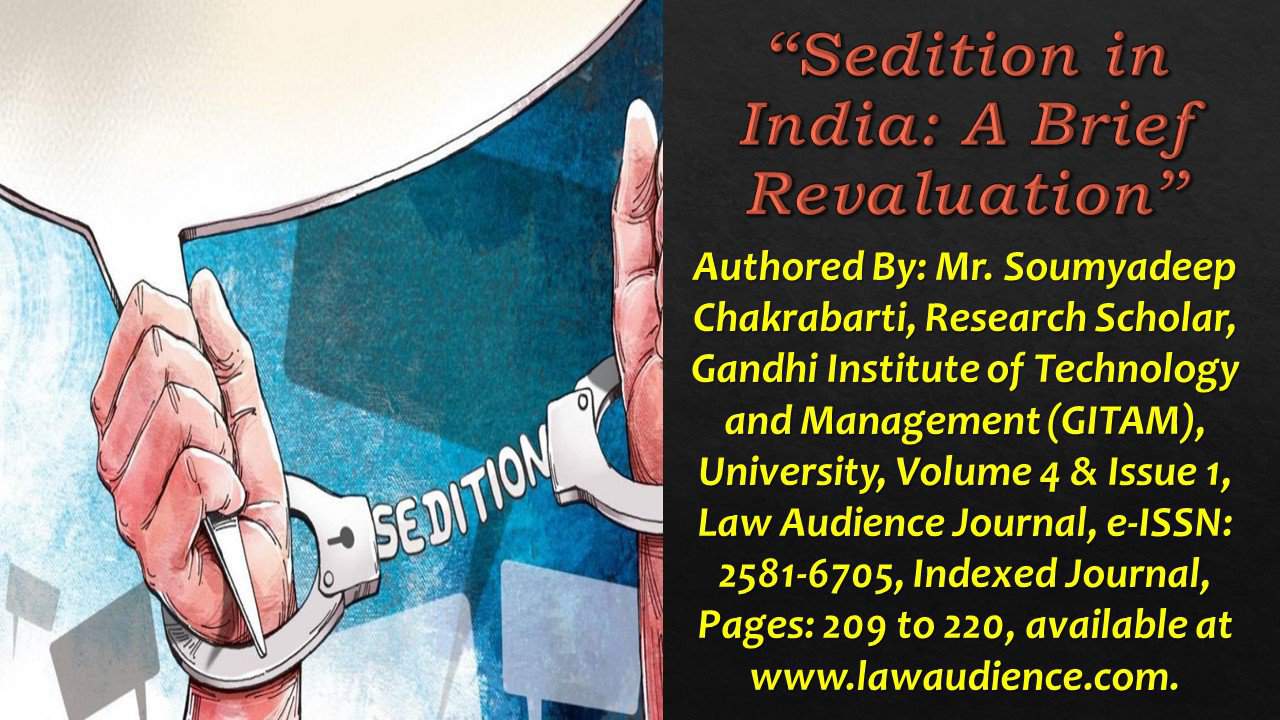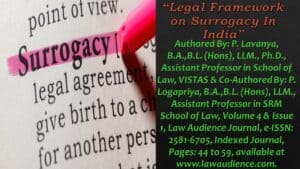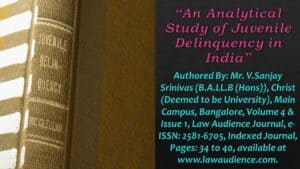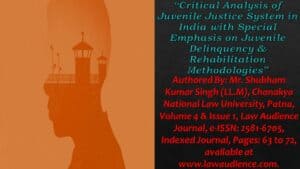Click here to download the full paper (PDF)
Authored By: Mr. Soumyadeep Chakrabarti, Research Scholar, Gandhi Institute of Technology and Management (GITAM), University,
Click here for Copyright Policy.
ABSTRACT:
“The main thing to recall about sedition legislation is that this rule was passed and imposed upon us during a period when we were overwhelmed by a powerful colonial settler and their vanquishing force. The Britishers’ essential objective was to dominate and refuse the occupants of this country their privileges, particularly the opportunity to voice their viewpoints. Strangely, while subversion was remembered for Lord Macaulay’s unique draft of the Indian Penal Code, 1860, it didn’t make it into the last adaptation when it was passed in 1860. At the point when Section 124A was revised in 1898, it changed the discernment encompassing rebellion. The primary sentence characterizes the offence of sedition as impelling or endeavouring to affect feelings of disappointment with the public authority.
Rebellion is as yet an interesting wrongdoing when contrasted with different violations (it represents under 0.01 percent of all IPC wrongdoings). Nonetheless, a few areas of India are becoming subversion areas of interest. With 37 rebellion charges every, Assam and Jharkhand represent 32% of all sedition cases somewhere in the range of 2014 and 2018. The experts in Jharkhand have charged a few classes of demonstrators with rebellion. In excess of 3,000 individuals were accused of sedition in January last year, for contradicting the Citizenship Amendment Act (CAA) in 2019 and in excess of 3,300 farmers were charged for sedition in 2019 for voicing over land disputes. The current article features a few of the examples zeroing in on our disputed sedition law and a few foreign examples as well”.
Keywords: Sedition, Constitution, Freedom of Speech and Expression, Social Media, Violence.
I. INTRODUCTION:
The Supreme Court has asked the state governments and police to avoid recording any First Information Report (hereinafter referred to as FIR) and leading any procedures under Section 124A of the Indian Penal Code that relates to sedition. The Hon’ble Supreme Court on Wednesday, 11th May, 2022 suspended the utilization of the sedition regulation and guided the union government and the state governments to not enrol any new FIR’s summoning and charging with sedition the validity of the said law is properly investigated. In the forthcoming sedition cases, the Hon’ble Supreme Court said those people who are rotting away in police custody/ judicial custody or prison under sedition charges can move for bail before the courts.
The Hon’ble Chief Justice of India N.V. Ramana led bench of the Supreme Court said that those who are already booked under Section 124A IPC and are in prison could move toward equipped courts for fitting help and bail. The Supreme Court remarked that union government concurs that the afflictions of Section 124A isn’t on top of the ongoing priorities nowadays and it was planned for when the nation was under foreign occupation. Subsequently, the union government might rethink it from a fresh perspective.
This is the initial occasion when it’s origin that the arrangement of Section 124A has been suspended. The courts said the subversion regulation arrangement would stay suspended endlessly and till additional orders from the court. Likewise, the Supreme Court said that the Union government is allowed to give extra privilege to states. Prior in the day, Solicitor General Tushar Mehta told the Supreme Court, which is hearing the legality of sedition case, that the union has arranged a draft for the re-examination of the law. The draft expresses that a FIR will be enrolled with sedition charges provided that a cop of the position of SP says there is a substantial justification for the equivalent. On Tuesday, Tushar Mehta had let the Supreme Court know that the union government was currently rethinking about the sedition regulation.
Mr. Mehta contended that where there is a cognizable offence, the Constitutional court remaining the [probe] request isn’t suitable. Allow the investigation to be finished by a dependable senior official under legal the process. Talking about the forthcoming cases concerning the conjuring of sedition regulation, he said that this is a cognizable offence and we don’t yet have the foggiest idea about the gravity of each forthcoming offence. There could be psychological warfare, illegal tax avoidance or some other offence. The cases are forthcoming with the legal official and not the police. The court can consider doing that when a bail application is before the court, the court can speed up the cycle. Answering to the proposed problem, Kapil Sibal, who was showing up for the petitioner to look for the court’s headings on forthcoming cases, Mehta said that the court passing a judgement on a cognizable offence at the request of citizens in a PIL will start a terrible trend.
Hon’ble CJI Ramana said that at first sight assessment of this court it has been seen that Section 124A was forced when India was under British rule. The Union said it would re-examine the law and safeguard social liberties of the residents of India and find out if there is an abuse of the law. The state and union police ought to abstain from documenting any FIR and leading any procedures under Section 124A, the Hon’ble Court remarked. Remaining the conjuring of subversion charges till the law is reconsidered, the Apex Court posted the matter for hearing till July. The Supreme Court is hearing petitions testing the legitimacy of the law on rebellion which has been under serious public examination for its supposed abuse to dole out political retributions by different state-run administrations.
In July 2021, the Apex Court had asked the union government for what valid reason it was not cancelling the sedition regulation that was utilized by the British to shut the mouth of Mahatma Gandhi. The Hon’ble CJI enquired that this was the law utilized by the Britishers to quiet Mahatma Gandhi. Do you think this regulation is as yet fundamental? The court had underlined that their primary concern is the abuse of the sedition regulation and the responsibility of organizations in utilizing it. There is a serious danger of abuse the Hon’ble Supreme Court noted.
II. A FEW OF THE MILESTONE SEDITION CASES IN INDIA:
Among the legal academician community, it is believed that the original case to challenge the need and authenticity of Section 124A of the Indian Penal Code, 1860 (hereinafter referred to as the IPC ) was the case of Ram Nandan vs. State of Uttar Pradesh[1], in and around 1958 before failing in Tara Singh Gopi Chand vs. The State[2]. Section 124A of the IPC, as per the Hon’ble High Court at Allahabad, was ultra vires in nature and abused Article 19(1)(a) of the Indian Constitution. The constitutional validity of Section 124A was additionally tested under the steady gaze of a Constitution Bench of the Hon’ble Supreme Court in Kedar Nath Singh vs. State of Bihar,[3] with the contention zeroed in essentially on the fact that Section 124A clashed with the pith and substance of Article 19(1)(a) of the Indian Constitution. The Supreme Court decided that no wrongdoing of sedition(u/S.124A) if the accused had not in reality given such a public statements/comment which may cause, or said to have caused, or can possibly cause interruption of public peace, order or tranquillity either or not causing violence, subsequently overruling the judgement of the Hon’ble High Court at Allahabad. There is no offence except if the speech/comments are probably going to cause rioting or violence.
After this decision, the Hon’ble Supreme Court stated in 1995 in Balwant Singh & Anr. vs. State of Punjab[4], that simply raising slogans, for example, “Khalistan Zindabad” and “Raj Karega Khalsa” etc. didn’t comprise sedition since there was no proof or record of any public unrest happening due to the slogans being shouted aloud in a public forum. This legal position has been reaffirmed a few times, remembering in the instance of Bilal Ahmed Kaloo vs. State of Andhra Pradesh[5], and Common Cause vs. Association of India[6]. In these cases, the Hon’ble Supreme Court directed the courts be alert while dealing with allegations of sedition on an accused. The courts were told to stick to the standards put down in the Kedar Nath case[7]. It was stated that sedition charges can’t be tossed out by the government as they please in order to stop the citizens from censuring the public authorities or its policies.
The case of Kishore Chandra Wangkhemcha vs. Union of India[8], also challenges the legality and constitutionality of the Indian sedition law. Senior Advocate Colin Gonalves had appealed to Hon’ble Supreme Court of India to consider the Apex Court’s judgment in Kedar Nath Singh vs. State of Bihar[9], and it ought to be re-evaluated. Accordingly, a three-judge bench of the Hon’ble Supreme Court, comprising of Hon’ble Justice U.U. Lalit, Hon’ble Justice Indira Banerjee and Hon’ble Justice K.M. Joseph was pleased to notify that Section 124A of IPC is ultra-vires to the spirit of the Indian Constitution and invalid as well. Three additional petitions of similar nature were also heard alongside the Kishore Chandra Wangkhemkcha’s case on 16th July 2021, by a three-judge bench containing Hon’ble Chief Justice of India N.V. Ramana, Hon’ble Justice A.S. Bopanna, and Hon’ble Justice H. Roy. A few people and rights organisations like Retd. Major General S.G. Vombatkere, Aamoda Broadcasting Company Pvt. Ltd., and Editors Guild of India, have individually, have appealed against misuse of sedition laws by the government and the trend seen is increasingly it is being used to threaten media-persons, journalists and rights activists.
In this case, two journalists, to be specific, Mr. Kishorechandra Wangkhemcha, from Manipur and Kanhaiya Lal Shukla from Chhattisgarh, have been accused of sedition on their caricatures, cartoons and posts on social media. They have appealed by the way of a writ petition challenging the lawfulness of Section 124 A of the IPC. The remarks and posts made on Facebook, Mr. Kishorechandra Wangkhemcha had three FIR’s recorded against him under Section 124A. The comments and postings chastised the Manipur government for dealing with a circumstance at Manipur University, alluded to the Chief Minister of Manipur as an “agent of the Prime Minister” and reprimanded legislators and their relatives for making hostile to Schedule Tribe feelings. Kanhaiya Lal Shukla uploaded cartoons on Facebook that portrayed phony criminal encounters by the police. The highlighted points made the petition are that the petitioners contend that Section 124A disregards Article 19(1)(a) of the Indian Constitution, which ensures an individual the right to speak freely even against the government/administration and its policies. Section 124A, they contend, doesn’t force a reasonable restriction. Accordingly, it is excluded from the impediments on the right to speak freely enacted by Article 19(2) of the Indian Constitution. The petition moreover brings up that the point of reference set in Kedar Nath Singh vs. State of Bihar[10], is at this point not pertinent to the social thought at this point and the social conditions do not align with that of the 1960’s era. Elective regulations including well-being, security, and public request have been laid out. The candidates additionally called attention to that the arrangement’s equivocalness considers inconsistent execution and misuse. This is contradictory with the rights given by Article 19(1)(a) of the Indian Constitution.
Accordingly, Mr Sashi Kumar, a recognized writer/journalist, is the principal intervenor contending that the uncertain language of Section 124A has been twisted against the government and administration by political influence for political benefits. He guarantees that the objective of the sedition law was not to punish the contradicting free thinkers of the society, referring to the Constituent Assembly Debates and early Parliamentary Debates. Another person who is also a law professor by the name of Dr. Sanjay Jain, gave an outline of sedition law in various countries to help the Court in examining the resolution considering recent developments. He guarantees that since Section 124A was made by a colonial power to stifle hostile anti-colonial activities, it must be revisited. Another foundation by the name of ‘Foundation for Media Professionals’, also raises some comparative contentions concerning the arrangement’s made by the colonial government in order to curb non-armed or armed rebellion. Hopefully, the Hon’ble Supreme Court will give it verdict on the much-contested Section 124A of the Indian Penal Code, 1860, its constitutionality and legality.
In another case named, Vinod Dua vs. Union of India,[11] the Hon’ble Apex Court was pleased to state that only those acts which cause interruption or aggravation of public harmony, peace and tranquillity by depending on violence, are to be considered for sedition and not otherwise. In light of current realities of this case, the Court reasoned that the words utilized by Vinod Dua might best be portrayed as articulations of dissatisfaction with regards to measures taken by the public authority and its authorities for the ongoing emergency to be settled quickly and proficiently. They were not made to impel others or show a proclivity for creating problems or upsetting public harmony using violence. The Hon’ble Supreme Court went on to state that, a resident has the option to censure or remark on the activities of the public authority and its authorities to the length that he doesn’t instigate individuals to viciousness against the public authority laid out by regulation or with the goal of causing public turmoil. Sections 124A and 505 of the IPC should be used just when the words or articulations have a malicious propensity or goal of causing public violence or unsettling influence.
III. INDIA PROPAGATES SEDITION REGULATIONS TO NATIONS LIKE SAUDI ARABIA:
India’s sedition regulations were pioneer by the colonisers who have now done away with regulations in their own country. Even few countries like Scotland, South Korea and Indonesia have followed suit. India’s sedition regulation was utilized against captured Jawaharlal Nehru University Students Union President, Mr. Kanhaiya Kumar. These kinds of oppressive laws have been disposed of by the UK, Scotland, South Korea and Indonesia. Among the nations that clutch rebellion as a lawbreaker act: Saudi Arabia, Malaysia, Iran, Uzbekistan, Sudan, Senegal and Turkey, as this report brought up. The USA likewise has a subversion regulation, declared a long time back however with many parts struck down north of two centuries. Germany keeps a subversion regulation on its books generally as a result of post-Nazi responsive qualities.
Lately, those captured on rebellion charges incorporate an illustrator, pupils cheering Pakistan in a cricket match, a Gujarati caste group activist cum leader, and a Kerala person for a Facebook post. The majority of those charged were not vicious or had not prompted savagery, a legitimate pre-imperative for a rebellion charge. Rebellion in India isn’t unlawful, it stays an offence provided that the words, verbally expressed or composed, are joined by administrative problems, civil unrest and violence as well as prompting to brutality. Fali Nariman, established legal adviser and Supreme Court advocate, wrote in The Indian Express that at the point when an individual is named as a ‘threat to India’, it is disagreeable to India’s populace, however at that point to be ‘threat to India’ is certainly not a criminal offence, and it is certainly not sedition. However, rebellion was broadly invoked by Indian state police forces in 2014 out of that 72% of all India’s sedition cases from Jharkhand and Bihar. The state of Jharkhand revealed the most cases (18), trailed by Bihar (16), Kerala (5), Odisha (2) and West Bengal (2). Jharkhand and Bihar represented 72% of the all-out sedition cases in 2014. Bihar finished off with 28 captures, trailed by Jharkhand (18), Kerala (4), and Odisha (4). Out of 58 individuals 55 men and three ladies were captured for sedition. The NCRB recorded information for ‘Offences Against the State’ without precedent for 2014. ‘Offences Against the State’ have been arranged generally under two classes: Offences against state (under Sections 121, 121A, 122, 123 and 124A IPC) and offences facilitating animosity between various gatherings (under Sections 153A and 153 B IPC). Offences against state are additionally arranged into subversion (Section 124A IPC) and others (under area 121, 121A, 122, 123 IPC). Others, with 129 cases, represented 73% of the absolute bodies of evidence under offences against state.
On the whole, 512 offences against the state were accounted for in 2014, of which 176 were ‘offences against state’ and 336 were offences advancing ill will between various gatherings. Around 872 individuals were captured 865 men and seven females were booked under these violations. Offences against state (Sections 121, 121A, 122, 123 and 124A IPC) and offences advancing hatred between various gatherings (Sections 153A and 153B IPC). Upwards of 323 cases were accounted for under area 153A of the IPC for advancing hostility between various gatherings on ground of religion, race, spot of birth, and so on. Kerala announced the most — 59. Section 153B IPC, which covers ascription and affirmations biased to public mix, saw 13 cases. Kerala finished off with 72 instances of Offenses Against the State, Assam (56) was second, trailed by Karnataka (46), Rajasthan (39) and Maharashtra (34). Maharashtra announced the most captures — 204 for offences Against the State, trailed by Kerala (98), Meghalaya (67), Karnataka (63), and West Bengal (59). These best five states represent 56% of the complete captures across India.
IV. SEDITION IN INDIA AND A FEW COUNTRIES:
India:
Briefly stating that the following are the Indian Penal Code Sections Under Offences Against State in the Indian Penal Code, 1860:
- 121 – Waging, or endeavoring to take up arms, or abetting pursuing of battle against the Government of India.
- 121A – Conspiracy to commit offenses deserving of area 121.
- 122 – Collecting arms, and so on, with aim of taking up arms against the Government of India.
- 123 – Concealing with purpose to work with plan to take up arms.
- 124A – Sedition
United Kingdom:
The United Kingdom annulled the sedition regulation in 2009. England’s Law Commission had suggested the annulment of the law in 1977. Cancelling these offences will permit the UK to take a lead in testing comparable regulations in different nations, where they are utilized to stifle free discourse was proposed by Britain’s previous Parliamentary Under Secretary of State at the Ministry of Justice, said while nullifying the law.
United States of America:
In the USA, some subversion regulations have been cancelled or made a lost cause. The courts give a wide security to free discourse. Sections 2381 to 2385 of the US Code manage conspiracy, sedition and incendiary exercises pushing defeat of government. In any case, the law is seldom upheld to maintain the right to speak freely.
Canada:
Yet, subversion regulations exist in Canada and manage a disdain wrongdoing, the law has not been conjured after hundred years.
Scotland:
Scotland discontinued in 2010. Section 51 of the Criminal Justice and Licensing Act, 2010 abrogated the precedent-based regulation offences of subversion with impact from 28th March, 2011.
Indonesia:
In 2007, Indonesia proclaimed rebellion as ‘unlawful’, saying it had been gotten from its provincial Dutch bosses.
Malaysia:
Conversely, in October 2015, the Malaysian government court excused a test to its sedition regulation with similar beginning as India’s – frequently used to subdue political resistance. The Malaysian Sedition Act 1948 includes not just regulations on subversion against any ruler, administering government, organization of equity and freedoms and honours under the Federal Constitution; yet additionally takes inside its domain, restrictions on racial disdain discourse.
Saudi Arabia:
Saudi Arabia executed Shiite pastor and political protester Sheik Nimr al-Nimr for rebellion in January this year.
Germany:
Germany’s sedition regulation is generally a result of post-Nazi responsive qualities. Volksverhetzung, or “impelling individuals”, is a legitimate idea in Germany. The word freely means ‘subversion’.
Netherlands:
Under Articles 111-113 of the Dutch Penal Code, it is a wrongdoing to affront the King, the Heir Apparent and their companion in the Netherlands.
Norway:
Part 9 of the Norwegian General Civil Penal Code makes maligning the King/Regent of Norway, a wrongdoing. Segment 5 of the constitution expresses: “The King’s individual is consecrated; he can’t be reprimanded or denounced. The obligation rests with his Council.”
New Zealand:
The demonstration of ‘sedition’ quit being a wrongdoing following the presentation of The Crimes (Repeal of Seditious Offences) Amendment Bill in 2007 that became effective from 1st January, 2008.
South Korea:
The Republic of Korea annulled rebellion regulations during majority rule and lawful changes in the year 1988. In other words, South Korea got rid of its sedition regulations during lawful and popularity-based changes in 1988.
Singapore:
Last year, Singapore, which like India acquired colonial English regulation, revoked its sedition regulation 83 years after controlling nearby resistance to British pioneer rule was first presented. The Home Ministry said that critical parts of the Sedition Act have not been important in that frame of mind for quite a while, and the law was not really utilized for indictments. It said that few new regulations can adequately resolve gives that were under the ambit of the rebellion regulation. Singapore has sanctioned different regulations throughout the years to manage issues shrouded by the Act in a more designated and aligned way.
Australia:
The main complete regulation in Australia that contained sedition offence was the Crime Act 1920. It was explored two times once in 1984 and the second time in 1991. In 2005, corrections were made in Schedule 7 of the Anti-Terrorism Act (No 2) 2005. The Australian Law Reform Commission (ALRC) inspected whether the utilization of the expression “sedition” was proper to characterize the offences referenced under the 2005 correction. In 2010, a suggestion of the ALRC was executed in the National Security Amendment Act 2010, supplanting the word ‘sedition’ with ‘urging violent offences’.
Ghana:
On 27th July, 2001, Ghana’s parliament collectively revoked the Criminal Libel and Seditious Laws, which had been utilized to imprison various columnists previously. The cancellation follows the section of the Criminal Code (Repeal of the Criminal and Seditious Laws Amendment Bill) Act, 2001, by a consistent vote in the House.
Cite this article as:
Mr. Soumyadeep Chakrabarti, “Sedition in India: A Brief Revaluation”, Vol.4 & Issue 1, Law Audience Journal (e-ISSN: 2581-6705), Pages 209 to 220 (29th June 2022), available at https://www.lawaudience.com/sedition-in-india-a-brief-revaluation/.
References:
- https://www.indiatoday.in/law/story/sedition-law-case-centre-draft-proposal-supreme-court-1947978-2022-05-11 last accessed on 19-06-2022.
- https://blog.ipleaders.in/landmark-sedition-cases-in-india/ last accessed on 19-06-2022.
- https://freespeechcollective.in/2021/06/17/sedition-cases-2021/ last accessed on 19-06-2022.
- https://www.article-14.com/post/our-new-database-reveals-rise-in-sedition-cases-in-the-modi-era last accessed on 19-06-2022.
- https://indianexpress.com/article/explained/sedition-law-explained-origin-history-legal-challenge-supreme-court-7911041/ last accessed on 19-06-2022.
- https://www.orfonline.org/expert-speak/the-sedition-law-the-past-present-and-future/ last accessed on 19-06-2022.
Footnotes & References:
[1] AIR 1959 All 101 (FB).
[2] AIR 1951 Punj 27 (Z6).
[3] 1962 AIR 955.
[4] 1995 3 SCC 214.
[5] (1997) 7 SCC 431.
[6] AIR 2018 SC 1665.
[7] 1962 AIR 955.
[8] Ongoing writ petition before the Hon’ble Supreme Court of India – proper citation not available till 20-06-2022.
[9] 1962 AIR 955.
[10] 1962 AIR 955.
[11] Writ Petition No. 154 of 2020.




